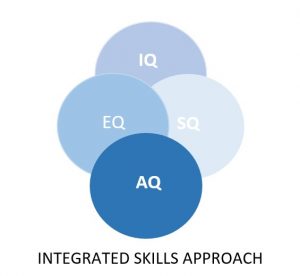Disruptive changes to organizations structures and business models have an impact on the employment procedures over the coming years. Socio-economic, technological and other changes is transforming business models and changing employees’ skills that required for career development.
During previous industrial changes, a professional career development based on employees’ intelligence quotient and their hard skills. Hard skills also known as technical skills are specific competencies, skills, knowledge, and abilities needed to perform a specific task or role. Hard skills can be learned through education and professional development.
Employee’s intelligence measured with a standardized IQ test. An intelligence quotient (IQ) is a total score derived from a set of standarized tests or subtests designed to assess human intelligence. IQ was a score obtained by dividing a person’s mental age score, obtained by administering an intelligence test, by the person’s chronological age, both expressed in terms of years and months.
Based on recent psychologists’ researches and other academic papers, soft skills are essential for employees’ career development and to enhance organization quality-safety culture. Daniel Goleman stated ‘that more than 80% of adult success comes from EQ.’
Emotional intelligence (EI) is defined as the ability to perceive, use, understand, manage, and handle emotions. People with high emotional intelligence can recognize their own emotions and those of others, use emotional information to guide thinking and behaviour, discern between different feelings and label them appropriately, and adjust emotions to adapt to environments. As per Daniel Goleman’s model of emotional intelligence includes five elements: 
1.Know your emotions, 2.Manage your emotions, 3.Motivate yourself 4.Recognize and understand other people’s emotions, 5.Manage relationships
These aforementioned elements are broken down into four sub-elements: 1.Self-Awareness, 2.Social Awareness, 3.Self-Management, 4.Relationship Management
Social Intelligence (SI) is the ability to understand one’s own and others’ actions. Social intelligence is learned and develops from experience with people and learning from success and failures in social settings. It is an important interpersonal skill that helps individuals succeed in all aspects of their lives. Social intelligence is an evolutionary adaptation for dealing with highly complex social situations, as well as for gaining and maintaining power in social groups.
An adversity quotient (AQ) is a score that measures the ability of a person to deal with adversities in their life. The AQ is one of the probable indicators of a person’s success in life and is also primarily useful to predict attitude, mental stress, perseverance, longevity, learning, and response to changes in environment.
Understanding the root cause of employees behaviour is a cornerstone, as without this it is unlikely any behavioural strategy to be sustainable. Understanding these multiple facets of integrated intelligence can assist employees to appreciate their unique qualities. The Dynamic Balance of IQ, EQ, SQ, and AQ is the key to personal and professional success.
Source: www.wikipedia.org, www.danielgoleman.info
Contact us to receive a professional advisory in your area of interest
